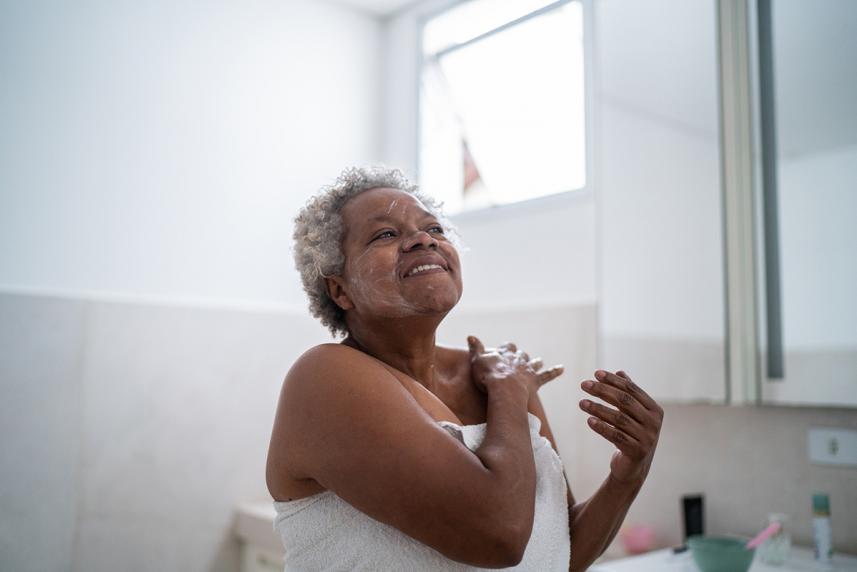
Find out if you qualify for an Aetna® Dual Eligible Special Needs Plan — we’re ready to help!
Learn everything you need to keep your skin healthy all season long

Winter is tough on your skin, whether you’re out braving the cold or staying warm indoors. The combination of frigid outdoor weather and heated, dry indoor air can leave skin parched and itchy, says Debra Jaliman, MD. She’s a dermatologist at Mount Sinai hospital in New York. And she’s the author of Skin Rules: Trade Secrets from a Top New York Dermatologist.
“The dry air sucks the moisture out of your skin. And in the cold weather, your skin attempts to conserve heat by constricting blood vessels, which dries out your skin’s outer layers,” Dr. Jaliman explains. The result? Dry, flaky skin that can crack and bleed — and even let in bacteria that can lead to infection.
While you can’t flash forward to warmer spring days, there is plenty you can do to keep your skin soft and supple through even the coldest winters. Here’s what you need to know.

Find out if you qualify for an Aetna® Dual Eligible Special Needs Plan — we’re ready to help!
Understanding why skin suffers in winter can help you steer clear of the causes. And it can help you pinpoint solutions for things you can’t avoid. Top culprits include:
Cleansers should put moisture into your skin, not wash it away. Avoid products that contain alcohol, which is drying. Steering clear of fragrances is also smart, says Dr. Jaliman. They are a top cause of contact dermatitis, an allergic reaction that creates a rash, redness and swelling. Basically, if you can smell it, there’s a fragrance in the product.
Instead, opt for products that say “gentle” and “moisturizing” on the label. If you have a skin condition like eczema, you likely need extra hydration. Washes that contain moisturizing ingredients like petroleum, shea butter and silicones are for you.
Keep your shower to 10 minutes or less and lower the water temperature. Dr. Jaliman recommends using lukewarm or even cool water if you don’t mind it.
When you’ve just come out of the shower and your skin is still wet, take advantage. Pat your skin with a towel — don’t rub it — to retain some of that moisture. Then apply a lotion or cream right away after you’ve finished to lock the moisture in.
“Apply moisturizers at least 20 minutes before going outdoors to allow maximum penetration into the skin,” says James Beckman, MD. He’s an adjunct clinical professor in the dermatology department at the University of Arkansas for Medical Sciences.
Ointments and creams are more effective than lotions, says Dr. Jaliman. Look for those that you squeeze from a tube or scoop from a tub. They tend to be thicker and hold more moisture. One super hydrating ingredient: hyaluronic acid. It absorbs 1,000 times its weight in water. Other moisturizing ingredients to look for on ingredient labels include:
For your face, choose a moisturizer that’s noncomedogenic. That means it will moisturize your skin without clogging your pores, which can cause acne. And be sure to check with your doctor if you have questions or concerns about using products with any of these ingredients.
Hands and feet are more likely to become dry, cracked and tender than other parts of your body. For one thing, the palms of your hands and soles of your feet have no sebaceous glands. These glands let out natural oils that lubricate skin. And your hands may be especially prone to dryness thanks to all the handwashing you’re doing to fend off colds, the flu and COVID-19.
Thick ointments that contain ingredients like glycerin are ideal for hands and feet. “Glycerin is a humectant. It works to moisturize the skin by drawing water from the air into the skin’s outer layer,” Dr. Jaliman explains. “It also serves as a protective layer that helps prevent moisture loss.”
For extra hand protection, wear rubber gloves when you’re doing something that requires getting your hands wet (like washing dishes). Wear them when you’re cleaning with harsh household chemicals, too. And as with your post-shower routine, dry your hands after washing them but leave them slightly damp. Then smooth on your hand cream or ointment.
It should be set between 68 and 72 degrees during the winter, says Dr. Jaliman. If you have a humidifier, plug it in to add moisture to the air.
The days may be shorter and the skies grayer this time of year. But protecting exposed skin from the sun is still key during winter. “The sun is actually even closer to the earth in the winter months. And clouds do little to filter out its rays,” says Dr. Beckman.
Swap out your usual sunscreen sprays for moisturizers with SPF. Most experts recommend using a sunscreen with an SPF of at least 30. Remember to put it on 15 to 20 minutes before heading outside. And don’t forget your lips: A thick ointment that has petroleum can help prevent chapping, says Dr. Jaliman.
We tend to sweat less and feel less thirsty in winter, so staying hydrated isn’t top of mind. But it’s still important to drink at least eight cups of water a day. This keeps your body well-hydrated, which in turn helps plump up your skin, says Dr. Jaliman.
If you are eligible for both Medicare and Medicaid, you may be eligible for an Aetna® Dual Eligible Special Needs Plan (D-SNP).
If you're 65 or older and have an eligible chronic condition, you may qualify for an Aetna® Chronic Condition Special Needs Plan (C-SNP). CSNPs are currently available in select counties within IL and PA.
You may be eligible for an Institutional Special Needs Plan if you’ve lived (or plan to live) in a participating facility for 90+ days and you have Medicare Part A (hospital insurance) and Part B (medical insurance).
Aetna Medicare is a HMO, PPO plan with a Medicare contract. Our DSNPs also have contracts with state Medicaid programs. Enrollment in our plans depends on contract renewal.
Plan features and availability may vary by service area.
For accommodation of persons with special needs at meetings, call 1-833-278-3924 (TTY: 711).
Participating health care providers are independent contractors and are neither agents nor employees of Aetna. The availability of any particular provider cannot be guaranteed, and provider network composition is subject to change.
The benefits mentioned are part of special supplemental program for the chronically ill. Eligibility is determined by whether you have a chronic condition associated with this benefit. Standards may vary for each benefit. Conditions include Hypertension, Hyperlipidemia, Diabetes, Cardiovascular Disorders, Cancer. Other eligible conditions may apply. Contact us to confirm your eligibility for these benefits. If you have questions, call us at 1-833-228-1297 (TTY: 711) 7 days a week, 8 AM to 8 PM.
Eligibility for the Model Benefit or Reward and Incentive (RI) Programs under the Value-Based Insurance Design (VBID) Model is not assured and will be determined by Aetna after enrollment, based on relevant criteria (e.g., clinical diagnoses, eligibility criteria, participation in a disease state management program).
To send a complaint to Aetna, call the plan or the number on your member ID card. To send a complaint to Medicare, call 1-800-MEDICARE (TTY users should call 1-877-486-2048), 24 hours a day/7 days a week. If your complaint involves a broker or agent, be sure to include the name of the person when filing your grievance.
Nondiscrimination Notice | CA-Specific Nondiscrimination Notice
©2025 Aetna Inc.
Y0001_3716005_2025_M
3152032-02-01
Call us at 1-833-228-1297 (TTY: 711) between 8 AM and 8 PM, Monday through Friday. Or visit AetnaMedicare.com/YourDSNP anytime.